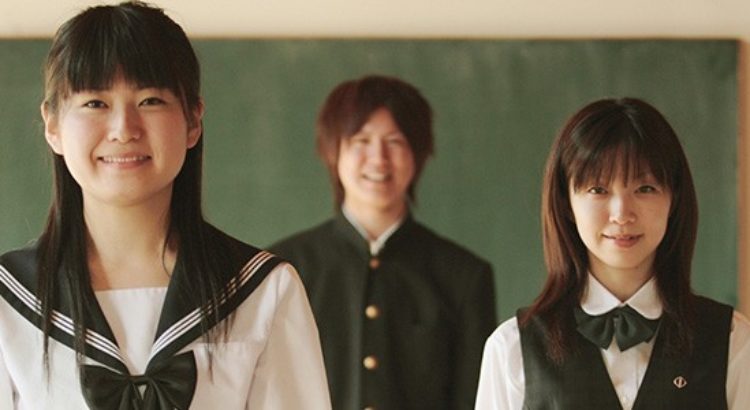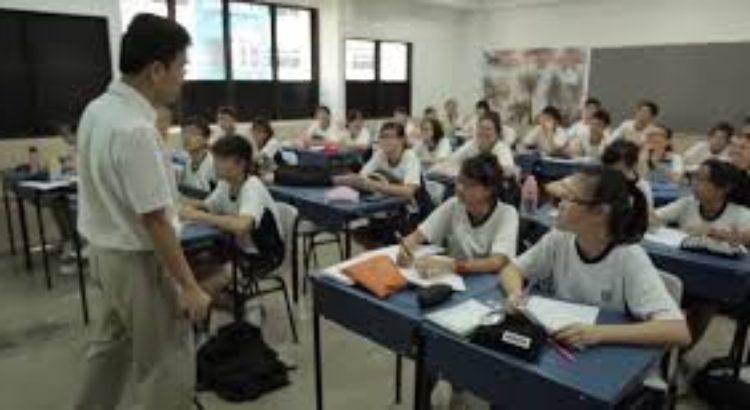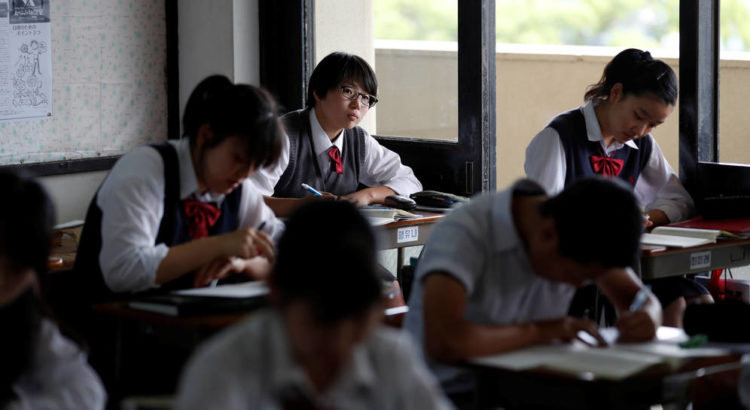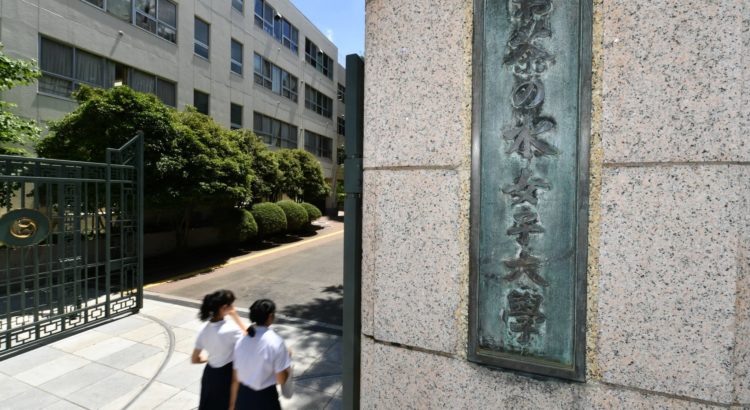Japón / 28 de octubre de 2018 / Autor: Nanba Tomoko / Fuente: nippon.com
Los uniformes de los estudiantes japoneses tienen su origen en la ropa que vestían los militares, mientras que los de las estudiantes comenzaron con el hakama, un pantalón largo tradicional que se caracteriza por sus pliegues. En esta ocasión, analizamos la impresión que tiene el pueblo nipón de las prendas escolares, que han ido evolucionando con el paso del tiempo hasta convertirse en lo que vemos a día de hoy: prendas de estilo marinero y blazers.
La Escuela Primaria Taimei ha dado mucho que hablar en 2018 por su decisión de recomendar a los estudiantes que se decantaran por la marca Armani a la hora de elegir sus uniformes. Aunque Japón es un país con una larga tradición de ropa uniformada en sus centros escolares, pocos colegios públicos de primaria los incorporan (entre un 10 % y un 15 %). Sin embargo, la tendencia es totalmente contraria en los de secundaria media y superior, independientemente de si se trata de centros de gestión pública o privada. Los uniformes se convierten en un símbolo de cada institución educativa, y estas prendas cobran importancia como parte de la adolescencia de quienes las llevan.
Hay tanto partidarios como detractores de que todo el mundo vista igual, pero es imposible no preguntarse por qué los uniformes están tan extendidos en Japón y cuál es el motivo de que se sigan usando durante más de un siglo.
Gakushūin, el origen de los uniformes escolares
Los uniformes son un símbolo social que permite identificar dónde estudian quienes los visten. En el caso japonés, la composición básica de estos atuendos es la misma en todos los centros —chaqueta y pantalón o falda—, pero se puede distinguir la institución en concreto por detalles como el color, la presencia o ausencia de líneas, el escudo y el pin. A partir de los diseños ligeramente diferentes, aun siendo similares, los japoneses son capaces de identificar a los portadores. Este “lenguaje” de los uniformes tiene una historia de más de un siglo; prácticamente todo el mundo lo conoce.
Para lograr que todos los estudiantes de un mismo centro lleven el mismo uniforme, es imprescindible contar con una normativa a tal fin. Sin embargo, el gasto que generan estas prendas corre a cargo de las familias. En Japón, esta dinámica tiene su origen en Gakushūin, una institución educativa privada.
Fundado como lugar de estudio para los hijos de la aristocracia, en 1879 la dirección del centro adoptó un uniforme que constaba de una chaqueta de cuello alto, unos pantalones y una gorra. La parte de arriba está inspirada en el atuendo militar que, con la llegada de la era Meiji (1868-1912), se occidentalizó rápidamente. En aquel entonces, Gakushūin tenía entre sus objetivos el de formar a oficiales de las fuerzas armadas, de ahí que entre las asignaturas que se impartieran figuraran disciplinas como la equitación y el manejo de espadas y lanzas. Así pues, puede decirse que el uniforme escolar tenía que cumplir la misma función que el militar. Ahora bien, en aquella época la ropa de estilo occidental era cara, por lo que solo las clases altas podían permitirse tal gasto.
 Estudiante de la Universidad Imperial uniformado (fotografía de 1906 cortesía de la autora).
Estudiante de la Universidad Imperial uniformado (fotografía de 1906 cortesía de la autora).
En 1879, el uniforme de los estudiantes de Gakushūin era exclusivo, pero acabaría convirtiéndose en el estándar del atuendo escolar masculino. En ello tuvo que ver la Universidad Imperial, que en 1886 decidió que sus estudiantes llevaran un uniforme compuesto por una chaqueta de cuello alto, unos pantalones y una gorra cuya parte superior era cuadrada. En aquella época, ir a la universidad era algo a lo que solo podía aspirar la élite, así que es posible que ese atuendo fuera motivo de muchas envidias. Los institutos de secundaria media y superior de todo el país tomarían la vestimenta obligatoria de ese centro de estudios superiores como modelo, de ahí que poco después se fuera propagando.
Los estudiantes de la élite fueron los primeros en llevar este tipo de uniformes inspirados en la vestimenta occidental moderna. De hecho, en aquella época, ponerse ropa occidental de vanguardia revelaba la posición privilegiada que ocupaba esa persona en la sociedad japonesa; esto es, no era algo exclusivo de los uniformes escolares. Para los alumnos, su atuendo era una forma de transmitir su condición social y de pertenencia, y de hacer gala ante la sociedad de que se trata de personas sobresalientes y prometedoras.
Los uniformes femeninos: del hakama al estilo marinero
En cuanto a las estudiantes, el hakama fue lo que se estableció como primer uniforme escolar en Japón. Antes de la Segunda Guerra Mundial, la educación se dividía por sexos después de la escuela primaria, por lo que las niñas que continuaban sus estudios iban a centros exclusivamente femeninos. En torno al año 1900, el hakama comenzó a imponerse como uniforme entre las estudiantes de estos institutos. Originalmente, se trataba de un pantalón de pliegues que llevaban los samuráis, y no de una prenda femenina. Sin embargo, el modelo que conformaba el uniforme escolar era una falda, una prenda de nueva creación de la era Meiji. A comienzos de esta etapa histórica, había chicas que se ponían el hakama masculino, pero las duras críticas por este comportamiento motivaron la creación de una versión para mujeres.
 Estudiante con hakama, circa 1900 (cortesía del Archivo de la Universidad Femenina de Ochanomizu).
Estudiante con hakama, circa 1900 (cortesía del Archivo de la Universidad Femenina de Ochanomizu).
En aquella época, los institutos femeninos hacían énfasis en la educación física como forma de cultivar un cuerpo sano. El hakama, a diferencia del kimono, permitía esconder las piernas si se movía, de ahí que los centros educativos lo recomendaran como prenda de vestir para hacer ejercicio activamente. A algunas estudiantes les encantaba y estaban deseosas de llevarlo debido a la imagen que tenían de él: una prenda de la nobleza, asociada con la corte y la Casa Imperial. Entre las cortesanas, había mujeres que lo llevaban desde la antigüedad, con una distinción de colores en función de su estado civil (morado para las solteras y rojo para las casadas). El hakama del uniforme escolar se encontraba a caballo entre el modelo masculino convencional y el femenino de la corte. El más usado por las escolares de la era Meiji era granate.
Las estudiantes que ansiaban llevar esta prenda se la llegaron a poner para ir a clase y le pidieron al director que la instaurara como uniforme. Podría decirse que su empeño fue determinante para conseguirlo. Combinaban el hakama, de cachemira importada, con accesorios occidentales como los lazos y las sombrillas e iban a la última moda con esa mezcla de lo local y lo foráneo que tanto les gustaba.
En la década de 1920, los uniformes escolares femeninos comenzaron a occidentalizarse también, siendo el marinero uno de los modelos más aceptados por las alumnas. Según datos de la época, había chicas que hacían cambios en el uniforme para adaptarlo a su gusto, aunque esto contraviniera la normativa de los centros escolares: le hacían varios pliegues a la falda y la parte superior, más corta. Esta conducta pone de relieve su deseo de no adherirse a las normas impuestas por la autoridad escolar, sino de hacer su propia interpretación del uniforme y materializarla. A día de hoy, este comportamiento sigue siendo común. Otra cosa que no ha cambiado en este sentido es la relación entre los profesores, encargados de supervisar que se cumpla la normativa, y las estudiantes, que rompen las reglas para satisfacer sus deseos: ambas partes juegan al gato y al ratón.
Popularización, críticas y diversidad de diseños
Un recorrido por la historia de los uniformes escolares como este nos permite ver que estas prendas han despertado diversos sentimientos a lo largo del tiempo, su cara y su cruz: los uniformes como muestra de las normas de los centros educativos y como reflejo de quienes las infringen para expresar sus anhelos e ideales.
Desde la era Taishō (1912-1926) hasta la Shōwa (1926-1989), las escuelas de educación secundaria media, exclusivas para varones y regidas por un sistema antiguo, y los institutos femeninos vieron un aumento en el número de alumnos y alumnas. Al mismo tiempo, el desarrollo de la industria textil fomentó que las clases populares pudieran tener acceso a la ropa de estilo occidental, de ahí que los uniformes, hasta entonces propiedad exclusiva de los escolares de la élite y de las estudiantes elegantes, se fueran popularizando gradualmente. Llevar lo mismo era también un símbolo de igualdad, de ahí que se pensara que los uniformes se convertirían en una forma de ocultar la disparidad entre ricos y pobres.
Tras la Segunda Guerra Mundial, hubo un tiempo en que se temió por la continuidad de los uniformes, entre finales de la década de 1960 y principios de la siguiente, debido al movimiento estudiantil de corte político. En ese tiempo, se criticó los uniformes como símbolo de la educación de gestión y hubo instituciones que los abolieron o dejaron a criterio de los estudiantes el llevarlos o no. La abolición se limitó a ciertos colegios del centro de las ciudades y no fue un movimiento de alcance total. En la segunda mitad de la década de 1980, algunas escuelas decidieron remplazar las chaquetas de cuello alto y el diseño marinero por blazers y cambiar el estilo de los uniformes. La oferta se fue diversificando y, con ello, la opinión sobre esta vestimenta volvió a ser positiva, hasta llegar a nuestros días.
Recuerdos bonitos asociados a los uniformes
¿Cómo es posible que no desaparecieran los uniformes a pesar de las críticas? Las normas que rigen su uso son minuciosas y en ocasiones pueden causar molestias, por no hablar de su precio, mucho más caro si se compara con el de la denominada moda rápida. Aun así, se siguen llevando.
Si le preguntamos a la gente qué opina al respecto, llama la atención el hecho de que su uso no se limita exclusivamente al tiempo que los alumnos pasan en el centro donde estudian. Hay quienes no pueden evitar entablar conversación con alguien que lleva la ropa de su alma mater, y quienes ponen el grito en el cielo cuando se hacen cambios en el diseño del colegio al que fueron. En otras palabras, el uniforme tiene peso en los recuerdos de muchas personas que fueron estudiantes. El motivo de que no desaparezcan tan fácilmente lo encontramos en este fuerte apoyo, en la idealización de los recuerdos asociados a estas prendas de vestir y en la nostalgia. Posiblemente, los uniformes nos hacen recordar de dónde venimos y echar de menos nuestra época de estudiante.
Huelga decir que no todo el mundo está a favor de esta vestimenta. Hay quienes no tienen buenos recuerdos de la obligación de ponerse lo mismo que el resto. Por otra parte, existen diversos problemas en torno a su uso, como la falta de personalidad, los costes y el impacto que tienen en las minorías sexuales. No obstante, ver a los estudiantes estrenando uniforme al inicio del curso es una estampa propia de la primavera motivo de deleite. Esta ambivalencia muestra que la cultura de los uniformes escolares es y ha sido ambigua y polifacética. Los uniformes tienen ventajas y desventajas, partidarios y detractores; es imposible explicar en pocas palabras por qué se usan.
Imagen del encabezado: Varios estudiantes de secundaria superior posan delante de un encerado (Aflo).
(Traducción al español del original en japonés)
Fuente del Artículo:
https://www.nippon.com/es/column/g00554/
ove/mahv



















 Users Today : 18
Users Today : 18 Total Users : 35460149
Total Users : 35460149 Views Today : 31
Views Today : 31 Total views : 3418814
Total views : 3418814